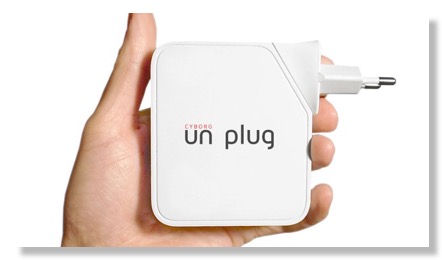Beginning of Wi-Fi Privacy-Related Electronic Warfare
In a previous post we wrote about the jamming threat to Wi-Fi and cellular that may come from unrestricted access by private drones to their spectrum. Today, a CNN post provocatively entitled “This gadget can knock drones and Google Glass offline” describes a device called the “Cyborg Unplug”. Its maker describes it as
Cyborg Unplug is a wireless anti-surveillance system for the home and workplace. 'Plug to Unplug', it detects and kicks devices known to pose a risk to personal privacy from your local wireless network, breaking uploads and streams. Detected devices currently include: Google Glass, Dropcam, small drones/copters, wireless 'spy' microphones and various other network-dependent surveillance devices.
Cyborg Unplug comes hot on the heels of glasshole.sh, a script written by Julian Oliver to detect and disconnect Google's Glass device from a locally owned and administered network. Following broad coverage in the press, the script struck a chord with countless people all over the world that felt either frustrated or threatened by the growing use and abuse of covert, camera-enabled computer technology.
Whether business office, restaurant, school or nightclub: it's your territory and your rules, so make it harder for those that seek to abuse it.
The maker describes the 2 modes of the device:
Cyborg Unplug can be operated in two modes. The recommended mode is Territory Mode, disconnecting target devices from selected network(s) owned and operated by the user. The other mode is All Out Mode, which disconnects all detected target devices from any network they are associated with, including paired connections with smartphones. Please note that this latter mode may not be legal within your jurisdiction. We take no responsibility for the trouble you get yourself into if you choose to deploy your Cyborg Unplug in this mode.
We will not parse here US rules and regulations about whether this is illegal. Nor will we speculate on whether it will actually work as advertised. This new product and its website and PR campaign shows the pent up demand for privacy protecting devices. If this device becomes popular, explicitly illegal Wi-Fi jammer manufacturers probably will go after the same market and a whole cycle of electronic warfare will begin.
The Wi-Fi industry and cellular industry should do some soul searching about whether their nonchalant attitude towards privacy invading uses of their technology contributes to supply and demand issues for jammer-like devices. Your blogger was once involved in electronic warfare issues decades ago. He does not want these to come to the dynamic civil communications systems that contribute so much to our society and economy.
Once Pandora’s Box is fully open, large NALs to mysterious Chinese companies will really have no impact.
Leaders of the Wi-Fi and cellular industries: Are there actions your industries are taking or trends which you are ignoring that are stimulating the demand for jammers? Will addressing these issue within your industries be more effective than relying on the currently underfunded FCC to solve severe problems that are likely beyond its resources if they take hold?




![Validate my RSS feed [Valid RSS]](valid-rss-rogers.png)

